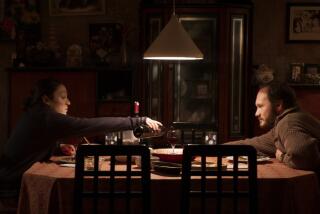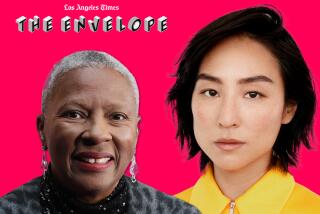‘Xiu Xiu’ Searingly Recalls a Chapter in Harsh History
- Share via
During the Cultural Revolution (1967-76), some 7.5 million urban Chinese teens were “sent down” for “re-education,” working alongside peasants often in the remotest regions of a vast country. These young people, often from educated, middle-class families, were to return home eventually, having been indoctrinated in the government’s dream of creating a communist utopia--but just if or when became increasingly uncertain as time passed.
Joan Chen’s prize-laden “Xiu Xiu: The Sent Down Girl” is intended to honor that last generation who came of age during that brutal period. Adapted by Chen and Yan Geling from Yan’s novella “Heavenly Bath,” the beautiful but devastating “Xiu Xiu” tells the story of the daughter of a clothing factory worker in the city of Chengdu. Xiu Xiu (Lu Lu) is a pretty, vivacious girl, nourished in a poor but loving family. When she is taken away, as part of a large group, she feels as if she is off to an exciting adventure.
After a year of service at a camp in the country, where the young people undergo tedious indoctrination in communism and work the fields, she is eager to return to her family. It is a cruel irony that her commander rewards her diligence with six months of “private training” to prepare her for the prestigious White River Iron Girls Cavalry. What this means is that Xiu Xiu is to be transported to the plains of Tibet, where she will learn how to train horses and yak herding from a Tibetan, Lao Jin (Lopsang), renowned as a rifleman as well as for his skill with horses.
Lao Jin, however, is even better known for having been emasculated by the Chinese. A stocky, kindly middle-aged man with an earthy sense of humor, Lao Jin has come to terms with his fate by living a simple, nomadic existence. He’s used to being jeered at over his fate, and he can take in stride Xiu Xiu’s contempt for him as she settles in the much-patched army tent she is to share with him. As Xiu Xiu grows increasingly unhappy and restless over her fate, Lao Jin falls ever more deeply, if silently, in love with her, caring for and protecting her in ways she lacks the capacity to appreciate.
When six months pass and no one comes to take her home, she becomes increasing overcome with despair, propelling her into a downward spiral. The fate that awaits her, which on one level embodies Tibetan legend, is scarcely less dire than the one accorded to “The Last Emperor’s” beautiful empress, played so memorably by Chen herself.
The connection between what happened to Lao Jin and what happens to Xiu Xiu is unmistakable and constitutes a condemnation of the terrible savagery of the Cultural Revolution and of China’s longtime oppression of Tibet. (Chen was fined heavily by the government for having made this film and was further barred from filmmaking in China.) The ability to express the utmost suffering and degradation with detachment and beautiful imagery is a major constant of Asian cinema. In its impassioned concerns and in the lyrical simplicity of its style, “Xiu Xiu” is, in fact, in the classic manner, and Lu Yue’s glorious camera work and Johnny Chen’s soaring score contribute strongly to this effect.
“Xiu Xiu” is remarkably mature for a first work, and Chen, accomplished actress that she is, displays an assured, understated skill in inspiring so young a talent as Lu Lu (she was 15 at the time of filming) in expressing so faultlessly Xiu Xiu’s wrenching transformations. At the same time, she knows how to draw upon Lopsang’s experience and solid presence to anchor her film. There’s no denying that “Xiu Xiu” gets tougher and tougher to take, but it leaves you rewarded with the lingering intensity of its impact.
* MPAA rating: R, for strong sexual content. Times guidelines: The films contains several sequences of rough sex, some of it fairly explicit, and other scenes of brutality.
‘Xiu Xiu: The Sent Down Girl’
Lu Lu: Xiu Xiu
Lopsang: Lao Jin
Gao Qiang Jie: Peddler
A Stratosphere Entertainment presentation of a Whispering Steppes L.P. production. Director Joan Chen. Producers Joan Chen, Alice Chan. Executive producers Joan Chen, Allison Liu, Cecile Shah Tsuei. Screenplay by Yan Geling, Joan Chen; from Yan’s novella “Heavenly Bath.” Cinematographer Lu Yue. Editor/associate producer Ruby Yang. Original music Johnny Chen. Sound designer Jay Boekelheide. Production designer Pan Lai. Art director Liu Shiyun. In Mandarin, with English subtitles. Running time: 1 hour, 34 minutes.
At selected theaters in Los Angeles and Orange counties.


